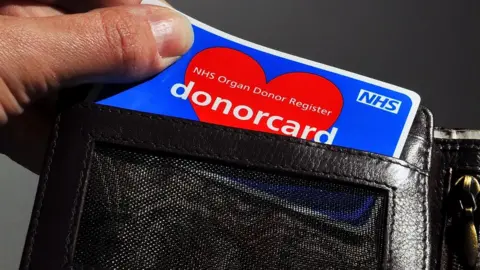Organ donors should let family know of intentions, says NHS
 Richard Crease/NHSBT
Richard Crease/NHSBTMore than 450 relatives of organ donors declined permission to donate as they were unsure of their relatives' wishes in 2016, figures have shown.
NHS Blood and Transplant (NHSBT) says families are reluctant to give their loved one's organs to patients.
Last year, 457 people died while on the active transplant waiting list, and currently there are 6,414 patients waiting for organs.
NHSBT says donors should ensure they have told relatives of their wishes.
Assistant director of organ donation Anthony Clarkson: "It's a tragedy, hundreds of people are dying unnecessarily every year waiting for transplants.
"We know that if everyone who supported donation talked about it and agreed to donate, most of those lives would be saved."
It is campaigning for more people to become donors, and let their families know their intensions, as part of Organ Donation Week which began on Monday and ends on Sunday.
Currently England and Northern Ireland operate an opt-in scheme, where potential donors need to make their wishes known.
 PA
PAWhereas in Wales, the NHS has an opt-out clause, where people inform the NHS Organ Donor Register if they do not want to donate.
Scotland is set to also offer an opt-out, but the permission of a donor's family will still be sought.
Dr Clarkson added: "If you want to save lives, don't leave it too late to talk to your family.
"If you want to be a donor, your family's support is still needed for donation to go ahead, even if you are on the NHS Organ Donor Register."
The parents of a child who died waiting for a heart transplant decided to donate her kidneys after their daughter's passing.
Aoife O'Sullivan from Leigh-on-Sea in Essex, died aged four in March 2016 waiting for a heart transplant.
Mother Michelle O'Sullivan said: "If you are willing to accept an organ donation, it is only right that you should be willing to donate the special gift of life to another family."
The British Heart Foundation claimed that more than 250 people in the UK are waiting for a heart transplant, but only 200 operations took place in 2016 due to lack of organs.
The charity's associate medical director, Dr Mike Knapton, said: "For these people, it's an agonising wait for a new heart that could mean the difference between life and death.
"It takes two minutes to sign up to the Organ Donor Register, and even less time to have a conversation with your loved one about your wishes.
"This might seem like a difficult conversation, but it could save the lives of people in desperate need of a heart transplant, and ensure your wishes are respected after death."
